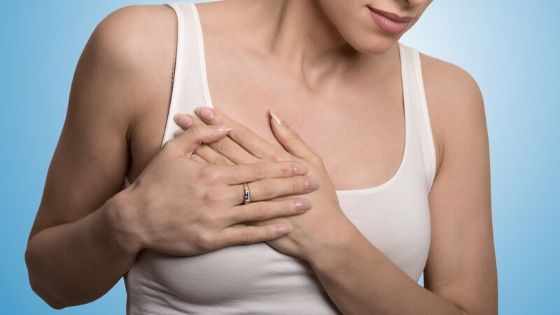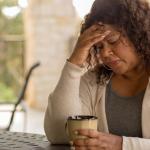
Understanding Breast Pain During Your Period
Many women experience swollen, tender breasts during or before their period. This common PMS symptom is almost always considered normal and tends to occur because of an increase in hormones –– particularly estrogen and progesterone. After your period is over and these hormone levels return to normal, your breast pain should resolve.
There are many possible explanations for sore breasts besides your menstrual cycle –– including pregnancy, cysts, medications, infection, or even a poor-fitting bra. Let’s discover the causes of breast pain during your period, how hormonal changes affect your cycle, and explore whether uterine fibroids may play a role in monthly breast discomfort.
COULD IT BE FIBROIDS? TAKE OUR QUIZ
Causes of Breast Pain During Menstruation
Breast pain linked to the menstrual cycle is referred to as cyclic mastalgia. This type of pain is primarily caused by the normal monthly changes in hormones. Estrogen and progesterone levels fluctuate throughout the menstrual cycle, leading to changes in breast tissue that can result in swelling, tenderness, and pain. These symptoms typically occur in both breasts and are most severe in the days leading up to menstruation, often subsiding once the period begins.
Symptoms of Cyclic Mastalgia
Common symptoms associated with cyclic mastalgia include:
-
Swelling and Tenderness: Breasts may feel swollen, tender, or sore to the touch.Wikipedia+1Healthline+1
-
Heaviness: A sensation of heaviness or fullness in the breasts.
-
Lumpiness: Breasts may feel lumpy or have areas of nodular tissue, which can fluctuate with the menstrual cycle.
-
Radiating Pain: Discomfort may extend to the underarm area.
These symptoms usually intensify in the luteal phase of the menstrual cycle (after ovulation and before the start of menstruation) and improve during or after the period.
Do Fibroids Cause Breast Pain During Your Period?
While uterine fibroids are primarily associated with symptoms such as heavy menstrual bleeding, pelvic pressure, and frequent urination, their potential link to breast pain is less direct and not fully established. Both fibroids and fibrocystic breast changes are influenced by hormonal fluctuations, particularly estrogen, leading to the hypothesis that they might co-occur due to similar hormonal environments. However, current research indicates that these conditions are separate entities without a direct causal relationship.
It’s important to note that experiencing breast pain does not necessarily indicate the presence of uterine fibroids, and vice versa. If you are experiencing persistent or severe breast pain, it’s advisable to consult with a healthcare provider to determine the underlying cause and appropriate management.
How to Alleviate Breast Pain During Periods
While it may be nothing to worry about, breast pain can nonetheless make you feel miserable. Here are some tips on how to deal with sore breasts during the days surrounding your period:
Wear a supportive bra –– even while sleeping. Perhaps the most important factor here is to find bras that fit correctly. Many department or lingerie stores offer free bra fitting services, so you might want to take advantage of those. For supportive day wear, try sports bras or look for standard bras with wide shoulder straps, comfortable fabric, and an underwire. At night, some women find that a sports bra, bralette, or camisole with built-in support are helpful options that allow them to sleep better.
Avoid caffeine, alcohol, fat, and salt. Reducing or eliminating these substances for one to two weeks before your period may help alleviate your breast discomfort, along with other unpleasant PMS symptoms.
Drink lots of water. It is generally recommended that you increase fluid intake during your period –– particularly on heavy days. Along with combating the negative effects of dehydration, drinking enough water may help reduce any swelling and bloating associated with menstruation.
Exercise. Stick to your workouts, no matter how tempting it is to skip them. Physical activity may alleviate a range of PMS symptoms. Exercise can also release your body’s natural painkillers –– endorphins –– which can help with your breast pain.
Use heat or ice therapy. You may find it comforting to place a hot water bottle, electric heating pad, or warm towels on your breasts to relieve pain and soreness. You can also try ice packs.
Take over-the-counter pain relievers. Try Ibuprofen, Naproxen, or Tylenol to reduce related pain. Before using, ask your doctor or pharmacist about potential drug interactions.
Consider hormonal birth control or diuretics (water pills). Although these can help reduce breast pain during periods, they can involve undesirable side effects and are not appropriate for everyone. Ask your doctor if such medications make sense for you.
When to Contact Your Doctor
If your breast pain only appears before or during your period, there’s probably no cause for alarm. However, we recommend contacting your doctor for evaluation if you notice any of the following breast changes that persist beyond your period:
- New or changing lumps
- Severe or persistent discomfort or pain
- Any changes in your nipple, including discharge
- Signs of infection like redness, pus, or fever
- Itching, scaling, dimples, or puckering
During your appointment, your doctor will likely perform a breast exam in search of any abnormalities. If anything of potential concern is detected, they can order an ultrasound and/or mammogram to gather more information about what is going on.
If you’re not sure whether your breast pain is cyclical, or are experiencing any additional health concerns, it’s a good idea to err on the side of caution and request medical evaluation.
MORE QUESTIONS? TALK TO A FIBROID SPECIALIST NOW
If you experience any of the above and believe fibroids may be associated, please talk to one of our fibroid specialists at USA Fibroid Centers. Our experts understand what you are going through and are available to answer all of your questions about fibroids and pain associated with your period.



